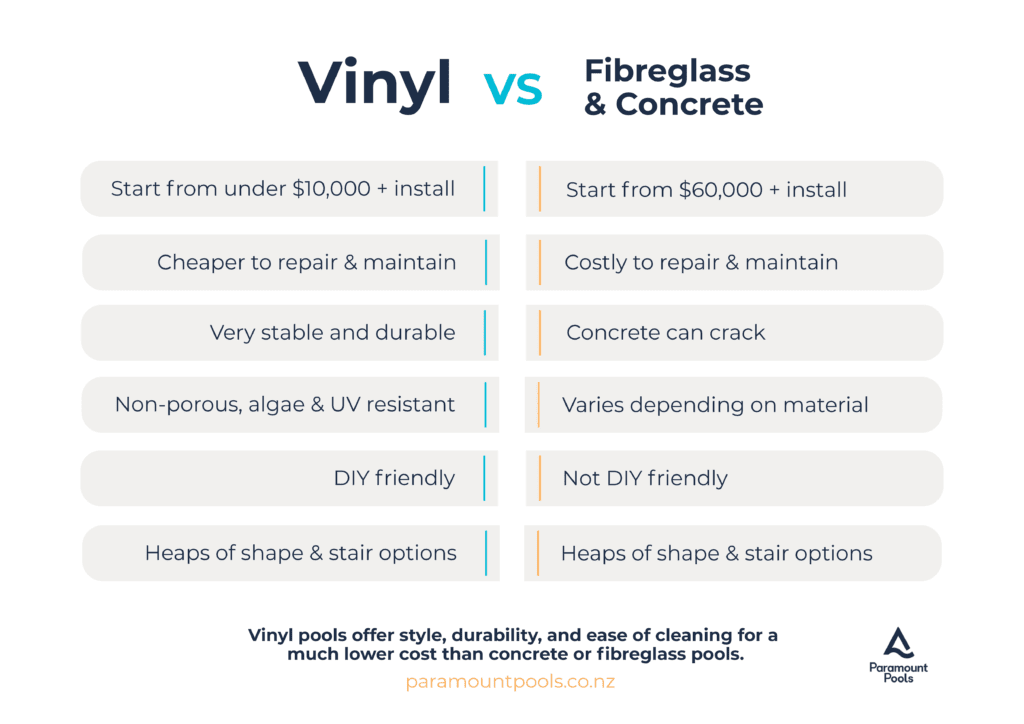Today there are more swimming pool options than ever before. Concrete and fibreglass pools are considerably more expensive than vinyl, but does that make them better? Vinyl technology has undergone substantial research and development leading to improved strength and durability.
Let’s look at how vinyl pools today stack up against fibreglass and concrete pools.
1- Vinyl swimming pools cost less. Most concrete pools start at $60,000 and can easily reach over $100,000. They require fewer materials to make them stable. Also, freight costs are nowhere near as high – fibreglass pools require expensive transportation and cranes to get them into position, as they come prefabricated. Whereas you can purchase a vinyl pool package for less than $10,000 plus installation.
2- When cared for correctly Vinyl pools are very stable and durable. Concrete pools can crack due to soil volatility and earth movement, which is especially problematic in earthquake-prone countries like ours.
3- Vinyl is 15 times thicker than paint and when the water is balanced will not chip, peel, separate or blister like other pool finishes. They are ideal for areas where heavy rainfall alternates with periods of drought, which can cause cracks in pools. As concrete can crack with freezing cold temperatures, vinyl pools are extremely popular in cold climates too.

4- When properly looked after Vinyl pool liners are extremely long-lasting and easy to maintain. Vinyl swimming pool liners typically last 10 to 20 years, so you can go decades without replacing them. But when it comes time to freshen up, they can be replaced from as little as $1500 + installation. Pool repairs and renovations with concrete and fibreglass pools can be extremely expensive to repair if they crack. Concrete pools require resurfacing at some stage, and the cost of sandblasting and painting can run into many thousands. It is risky to do it yourself, as there are many do’s and don’ts to ensure a quality finish that will last. Pool paint alone can also cost more than a vinyl liner.
5- Vinyl pools are easier to clean. Since they are non-porous and treated to resist algae, they require fewer chemicals to maintain sparkling water. You also have the option to install a low-salt water or mineral chlorinator, which converts salt/magnesium into chlorine. This makes the water softer and your swimming pool care regimen much easier. It also eliminates the burning sensation a heavily-chlorinated pool might have. They are also treated to resist UV rays, making them one of the lowest maintenance pool finishes available, even compared to fibreglass.
6- Another great benefit of vinyl pools is that they are DIY-friendly. If you’re handy and have some time on your hands, you can save money by installing the pool yourself. Many pools from 40 years ago were home projects, so it’s definitely possible to do it yourself if you’re up for the challenge. Of course, if you don’t have the time or skill for a DIY project, you can always opt for a full installation service. Either way, you’ll be enjoying your new pool in no time!
7- Vinyl liners today can be custom-made to suit the shape and size of your pool. Colours, patterns, and thicknesses are also available in a variety of options.
8- You can have all the bells and whistles. With vinyl pools, you can have an inground pool, custom pool, deep-end and stairs, just like in fibreglass or concrete pools!
It is exciting to select a swimming pool, but don’t think that the most expensive option is the best. With a vinyl pool, you can have style, durability, and ease of cleaning for a much lower price than with a concrete or fibreglass pool. When you buy from a highly reputable pool supplies company like Paramount Pools, you have peace of mind too.





